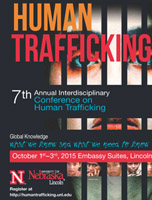Human Trafficking, Interdisciplinary Conference on

Annual Interdisciplinary Conference on Human Trafficking: 7th (2015)
Date of this Version
10-2015
Document Type
Article
Citation
7th Annual Interdisciplinary Conference on Human Trafficking, Lincoln, NE, October 1-3, 2015
Abstract
Human trafficking has become an issue for global concern. Here in the United States, the Federal government and all fifty states are taking steps to combat the pervasive problem. This study looks at the anti-human trafficking statutes of all fifty states and compares them with each other to see how each state stacks up against the other. Nebraska was the focus of the study as the unicameral has recently been enacting changes to the state’s laws against human trafficking. Nebraska was expected to at least be with the majority of states with their human trafficking provisions. The study then looked at the attitudes of Nebraska’s law enforcement and the general public towards the issue of human trafficking. Both were expected to believe that human trafficking is not a problem in Nebraska. The statute comparison was accomplished using state law databases, especially the one compiled by the Polaris Project. The language was then entered into excel datasheets for six major categories which are sex trafficking, labor trafficking, tools used by the prosecution, tools used by law enforcement, juvenile provisions, and victim centered provisions. The part of the study designed to look at attitudes was accomplished by an online survey that was distributed by Facebook and e-mail to the public and law enforcement personnel. A total of 150 responses to the survey was collected. The results for both parts of the study were as expected. Nebraska’s anti-human trafficking statute was with the majority of states and the public and law enforcement did not view human trafficking as a problem for Nebraska.
Included in
Human Rights Law Commons, Immigration Law Commons, International and Area Studies Commons, International Humanitarian Law Commons, International Law Commons, Labor and Employment Law Commons, Sexuality and the Law Commons


Comments
Copyright (c) 2015 Katie Sheets